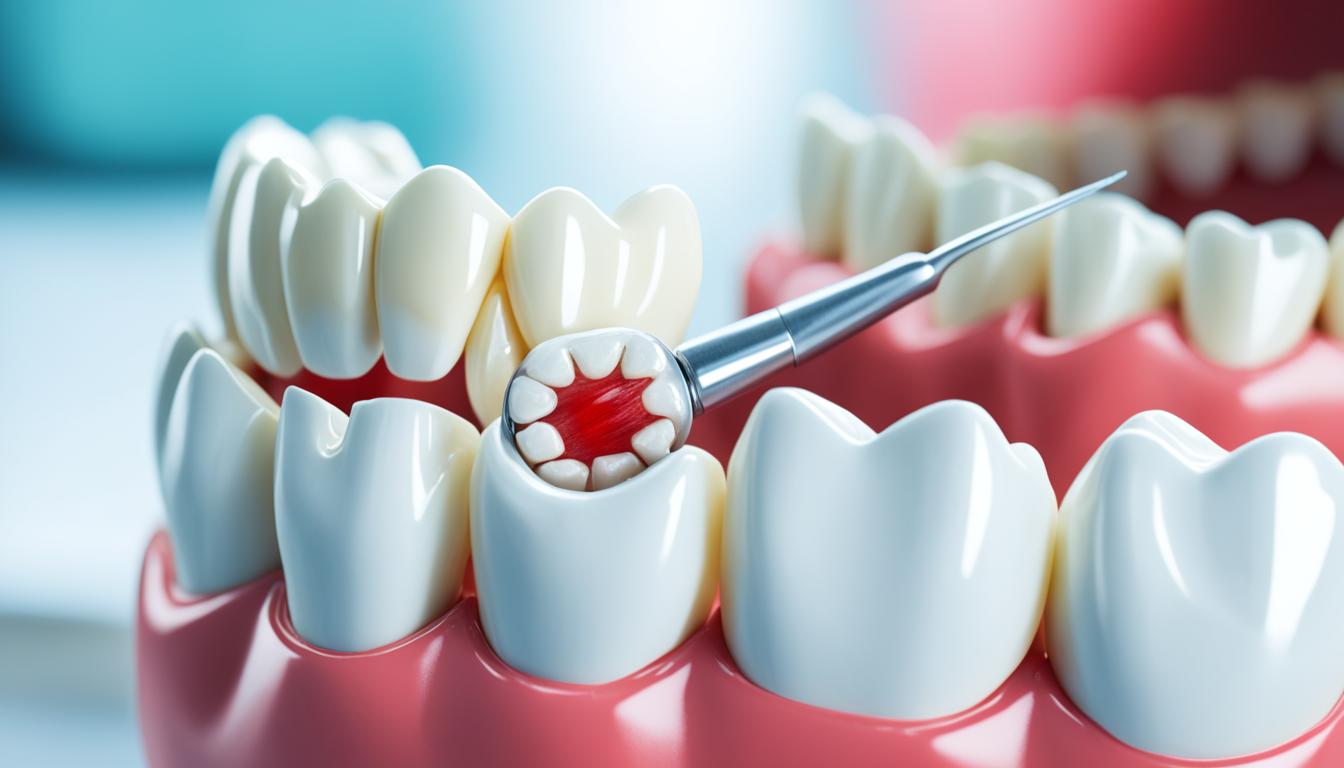Impacted wisdom teeth are a known issue in dentistry that, if not dealt with, poses significant risks. Typically, these third molars start to break through between the ages of 17 to 25. However, if there isn’t enough room for them, they can cause problems like jaw pain, swollen gums, and trouble with mouth opening. Neglecting impacted wisdom teeth could lead to severe issues like cysts, sinus problems, and overall dental health decline.
The best-known method to address impacted wisdom teeth is their removal by a dental surgeon.
Key Takeaways:
- Impacted wisdom teeth can cause severe issues if left untreated.
- Common symptoms include jaw pain, red or swollen gums, and difficulty opening the mouth.
- Complications can arise from untreated impacted wisdom teeth, such as damage to other teeth and sinus issues.
- Treatment usually involves the removal or extraction of the impacted teeth by an oral surgeon.
- Impacted wisdom teeth can provide a valuable source of stem cells for potential future use in regenerative medicine.
Symptoms and Complications of Impacted Wisdom Teeth
Recognizing early signs of impacted wisdom teeth is key to avoid complications. Here are signs that you might have them:
- Jaw pain: Discomfort in the jaw may mean you have impacted wisdom teeth. This pain can spread to your ear and throat.
- Red or swollen gums: Impacted wisdom teeth can make your gums red and swollen.
- Tender or bleeding gums: If your gums are tender or bleed easily, it could be a sign of impacted wisdom teeth.
- Swelling around the jaw: You might notice swelling or puffiness around your jaw if you have impacted wisdom teeth.
- Bad breath: A bad smell from your mouth might mean bacteria have built up around your impacted wisdom teeth.
- An unpleasant taste in the mouth: If your mouth tastes bad, bacteria around your wisdom teeth might be the cause.
- Difficulty opening the mouth: Impacted wisdom teeth can limit jaw movement, making it hard to open your mouth fully.
If you ignore impacted wisdom teeth, you could face serious complications. These include:
- Dental damage: The force from impacted teeth can harm or misalign nearby teeth.
- Cyst formation: Impacted wisdom teeth might lead to cysts that can hurt the jawbone, nearby teeth, and nerves.
- Sinus issues: Root pressure from impacted teeth can cause sinus problems and discomfort.
- Gum disease: It’s easier for bacteria to collect around impacted teeth, raising the risk of gum issues.
- Tooth decay: Hard-to-reach impacted teeth can more easily develop cavities and decay.
It’s essential to recognize symptoms of impacted wisdom teeth early and seek treatment. This is crucial for keeping your mouth healthy and avoiding further problems.
Treatment Options for Impacted Wisdom Teeth
Dealing with impacted wisdom teeth often means they need to be removed. An oral surgeon performs this operation under local anesthesia. They ensure the patient doesn’t feel any pain during the treatment.
There are various methods for treating impacted wisdom teeth, depending on each patient’s situation. If the teeth have fully come out and are visible, they can be extracted simply. The surgeon uses special tools to take out the tooth. This process is quick and has minimal discomfort, leading to a fast recovery.
But, if the teeth are under the gums, things are a bit more complex. A surgical method is needed then. The surgeon might need to cut the gums and remove bone to get to the tooth. They might also have to divide the tooth into pieces for a successful extraction.
After the surgery, recovering usually takes a few days. Patients should follow the advice of their oral surgeon closely. This involves taking any prescribed painkillers, using ice to reduce swelling, and keeping the mouth clean by gently rinsing with saltwater.
Side effects like swelling and discomfort are common shortly after the procedure. But, these symptoms lessen over time as the area heals.
Key Points:
- Impacted wisdom teeth are mostly extracted by an oral surgeon.
- The way they are extracted can vary if the teeth are fully out or still under the gum.
- A simple procedure can be used if the wisdom teeth are fully out.
- When the wisdom teeth are not fully out, a surgical method is necessary.
- Most people recover from the extraction in a few days with few side effects.
Note: Anyone with medical concerns about their wisdom teeth should seek advice from a professional.
Stem Cell Therapy for Impacted Wisdom Teeth
Impacted wisdom teeth hold a key to future medical breakthroughs. These teeth, when removed, offer stem cells that can be stored. These stem cells might be used in the future for regenerative treatments.
The stem cells from wisdom teeth can grow into many different cell types. This helps the body heal itself naturally. It’s a new approach to treating various health issues, from injuries to cancer.
By keeping these stem cells safe, they may offer personalized medical care ahead. Stem cell therapy could change medicine by addressing diseases directly.
Impacted wisdom teeth are not just a dental problem. They are a source of powerful stem cells for future health needs. By saving these cells, we might see big improvements in healthcare and scientific knowledge.

